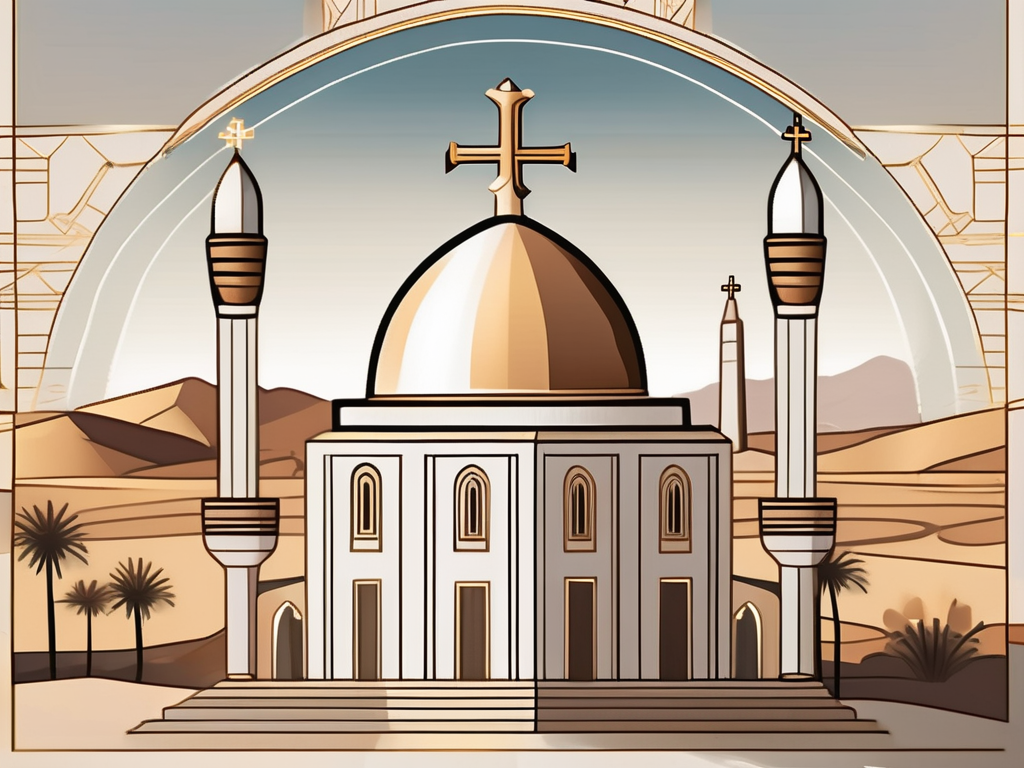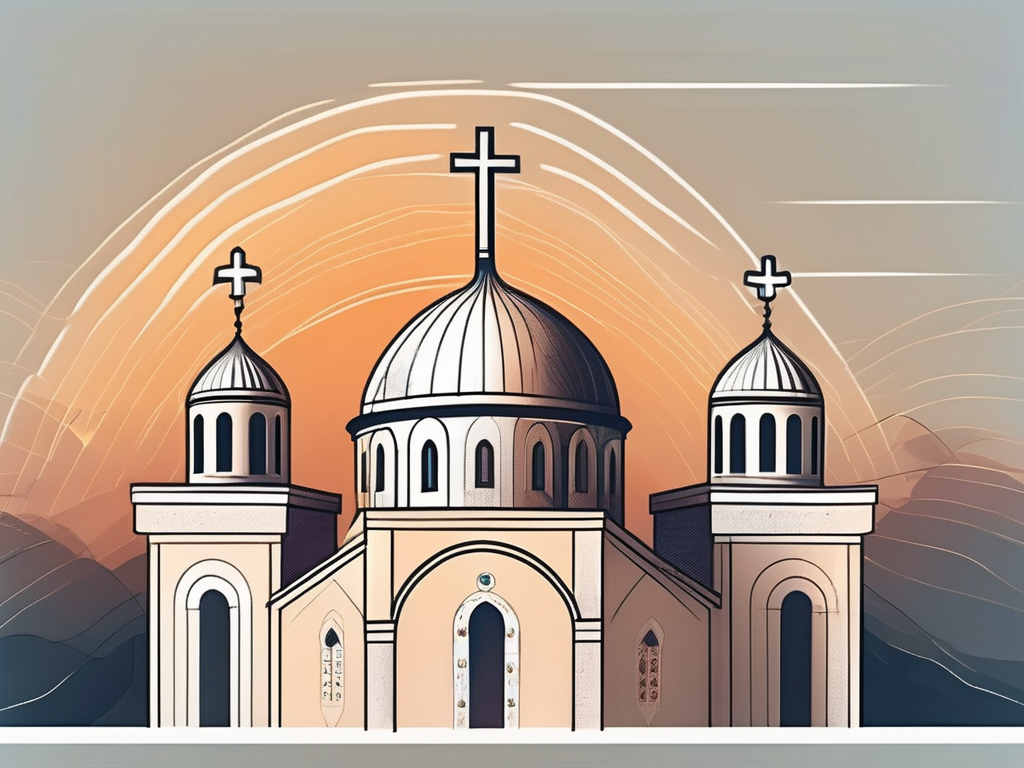Coptic Christianity is a fascinating and rich religious tradition that has stood the test of time. With roots dating back to the earliest days of Christianity, the Coptic Church has a unique identity and set of beliefs that have shaped the lives of millions of people. In this article, we will delve into the history, beliefs, practices, and challenges faced by Coptic Christians.
Understanding the Term ‘Coptic Christian’
First, let’s break down the term “Coptic Christian.” The word “Coptic” originates from the Greek word “Aiguptios,” meaning Egyptian. Therefore, a Coptic Christian is someone who follows the Christian faith within the Egyptian cultural context. This term is primarily used to describe members of the Coptic Orthodox Church, an ancient Christian denomination rooted in Egypt.
The Origin of ‘Coptic’
The term “Coptic” gained prominence in the late 2nd century AD when Egyptians began embracing Christianity. At that time, the majority of Egyptians spoke the Coptic language, a descendant of ancient Egyptian languages with a strong influence from Greek. Thus, the adoption of the term “Coptic” reflected a fusion of Egyptian identity and Christian faith.
The Coptic language itself is an important aspect of Coptic Christianity. It is the liturgical language of the Coptic Orthodox Church and has been preserved through the centuries as a symbol of the church’s rich history. The Coptic language is closely related to ancient Egyptian hieroglyphs and has played a significant role in the preservation of Egypt’s cultural heritage.
Furthermore, the Coptic Orthodox Church traces its origins back to the apostolic era, claiming direct lineage from the teachings of Saint Mark the Evangelist, who is believed to have brought Christianity to Egypt in the 1st century AD. The Coptic Orthodox Church has a distinct hierarchy, with the Pope of Alexandria serving as its spiritual leader and the successor of Saint Mark.
The Meaning of ‘Christian’ in this Context
When we refer to “Christian” in the context of Coptic Christianity, we are talking about those who follow the teachings of Jesus Christ and accept Him as their Lord and Savior. The core tenets of Christianity, such as belief in the Holy Trinity and the crucifixion and resurrection of Jesus, are central to the Coptic Christian faith.
Within the Coptic Orthodox Church, there is a strong emphasis on monasticism and asceticism. Monasticism has been an integral part of Coptic Christianity since its early days, with many monastic communities established in Egypt’s desert regions. These monastic communities serve as centers of spiritual growth and provide a haven for individuals seeking a life of prayer, contemplation, and detachment from worldly pursuits.
Another significant aspect of Coptic Christianity is its rich tradition of liturgy and worship. The Coptic Orthodox Church has a distinct liturgical tradition, characterized by its solemnity, reverence, and deep spirituality. The liturgical services are conducted in the Coptic language, preserving the ancient chants and hymns that have been passed down through generations.
Moreover, Coptic Christians have faced numerous challenges throughout history, including periods of persecution and marginalization. Despite these hardships, the Coptic Orthodox Church has remained resilient, maintaining its faith and cultural identity. Today, Coptic Christians can be found not only in Egypt but also in various parts of the world, contributing to the global Christian community.
The Historical Background of Coptic Christianity
Coptic Christianity has a rich historical background that spans over two millennia. Its roots can be traced back to the apostolic era when Saint Mark the Evangelist visited Egypt and preached the Gospel. Saint Mark established the first Christian community in Alexandria, laying the foundation for what would later become the Coptic Church.
But what were the circumstances that led Saint Mark to Egypt? It is said that he arrived in Alexandria during the reign of Emperor Nero, a time when the Roman Empire was at its height. Egypt, being a vital part of the empire, was a melting pot of cultures and religions. The city of Alexandria, in particular, was a bustling cosmopolitan center, known for its intellectual and cultural vibrancy.
As Saint Mark began his mission in Alexandria, he encountered a diverse population, including Greeks, Egyptians, Jews, and Romans. He faced both curiosity and resistance, but his message of salvation resonated with many. The Christian community grew, and Saint Mark’s teachings laid the groundwork for the development of a distinct Christian tradition in Egypt.
Early Beginnings
In the early centuries, Coptic Christianity flourished and developed its own distinct identity. The Coptic Church played a critical role in shaping early Egyptian Christianity, producing renowned scholars, theologians, and saints. One such figure was Saint Athanasius, the 20th Pope of Alexandria, who defended the divinity of Christ against the Arian heresy.
During this period, the Coptic Church faced numerous challenges. It endured persecution under various Roman emperors who saw Christianity as a threat to their authority. The Church also grappled with theological disputes, such as the Christological controversies that arose in the 4th and 5th centuries. These debates led to the formulation of the Coptic Orthodox understanding of the nature of Christ.
The Role in Egyptian Christianity
Throughout history, the Coptic Church has been deeply intertwined with Egyptian culture and society. It has served as a spiritual and cultural cornerstone, providing solace, guidance, and a sense of identity to the Egyptian people. Coptic Christians have made significant contributions to Egypt’s art, literature, and intellectual heritage, leaving an indelible mark on the nation’s history.
For instance, Coptic art is renowned for its intricate designs and vibrant colors. The Church’s influence can be seen in the beautiful frescoes and murals adorning the walls of ancient Coptic monasteries and churches. These artworks not only depict biblical scenes but also reflect the unique blend of Egyptian and Hellenistic artistic traditions.
In the realm of literature, Coptic Christians have preserved and translated numerous ancient texts, including the Bible and early Christian writings. The Coptic language, derived from ancient Egyptian, has played a crucial role in the preservation of Egypt’s cultural heritage. Coptic manuscripts have provided valuable insights into the history, language, and religious practices of ancient Egypt.
Moreover, the Coptic Church has been a source of social support and charitable work, particularly in times of crisis. During periods of political instability or natural disasters, the Church has mobilized its resources to provide aid and assistance to those in need. This commitment to serving the community has earned the Coptic Church widespread respect and admiration.
In conclusion, the historical background of Coptic Christianity is a tapestry woven with the threads of faith, culture, and resilience. From its humble beginnings in Alexandria to its enduring influence on Egyptian society, the Coptic Church has left an indelible mark on the religious and cultural landscape of Egypt.
Beliefs and Practices of Coptic Christians
Central to Coptic Christian beliefs are the core doctrines that form the foundation of their faith. These beliefs align with mainstream Christianity, emphasizing salvation through Jesus Christ and the importance of love, forgiveness, and compassion in one’s daily life.
Coptic Christians affirm the belief in the Holy Trinity, which consists of God the Father, God the Son (Jesus Christ), and God the Holy Spirit. They regard Jesus Christ as the incarnate Son of God, who sacrificed Himself on the cross for the redemption of humanity.
Additionally, Coptic Christians hold the Holy Scriptures, including the Old and New Testaments, as sacred and authoritative. The teachings of the early Church fathers are also highly regarded as a source of spiritual guidance.
One of the unique aspects of Coptic Christianity is its rich history and cultural heritage. The Coptic Church traces its roots back to the early days of Christianity in Egypt, where it flourished and became an integral part of the nation’s identity. The Coptic language, derived from ancient Egyptian hieroglyphs, is still used in liturgical prayers and hymns, connecting modern-day Copts to their ancient ancestors.
Alongside their core beliefs, Coptic Christians have developed unique rituals and traditions that distinguish their worship practices. These rituals often draw from ancient Egyptian customs and symbols, creating a harmonious blend of cultures.
One notable aspect of Coptic Christian worship is their adherence to the liturgical calendar. The Coptic calendar follows the Ancient Egyptian calendar, and their celebrations and observances reflect the rhythm of both Christian and Egyptian traditions. This calendar includes feasts and fasts that commemorate significant events in the life of Jesus Christ, as well as saints and martyrs revered in the Coptic tradition.
In addition to their liturgical practices, Coptic Christians place great importance on monasticism. Monasteries have played a vital role in the Coptic Church since its early days, serving as centers of spiritual growth and education. Many Coptic Christians choose to dedicate their lives to monasticism, seeking a deeper connection with God through a life of prayer, asceticism, and communal living.
Another distinctive feature of Coptic Christianity is the veneration of icons. Coptic Christians believe that icons are not mere paintings or decorations but windows into the spiritual realm. Icons are seen as a means of connecting with the divine and are used in worship, prayer, and meditation.
Furthermore, Coptic Christians place a strong emphasis on the sacraments, considering them as tangible encounters with God’s grace. The sacraments, including baptism, confirmation, Eucharist, confession, marriage, and ordination, are seen as transformative experiences that strengthen one’s relationship with God and the community.
Overall, the beliefs and practices of Coptic Christians reflect a deep-rooted faith that combines ancient traditions with a devotion to the teachings of Jesus Christ. Their rich history, unique rituals, and emphasis on spiritual growth make Coptic Christianity a vibrant and enduring tradition within the larger Christian faith.
The Coptic Church Structure
The organization of the Coptic Church reflects its rich history and the establishment of a hierarchical order. This structure ensures the spiritual guidance and efficient administration of the Church, allowing it to thrive and fulfill its mission.
The Coptic Church’s leadership structure consists of various ranks and roles, each with its own responsibilities and significance. These roles work together harmoniously to maintain the spiritual well-being of the Church and its members.
Hierarchical Order
At the top of the hierarchy is the Pope of Alexandria, who holds the esteemed position of the spiritual leader and the successor of Saint Mark, the apostle who brought Christianity to Egypt. The Pope’s authority and influence extend not only within the Coptic Church but also in representing the Coptic Orthodox Church on both national and international platforms.
The Pope plays a pivotal role in guiding the Church, providing spiritual direction, and ensuring the preservation of Coptic traditions and teachings. Additionally, the Pope has the authority to ordain clergy, consecrate bishops, and make important decisions regarding the Church’s affairs.
Beneath the Pope, there are bishops, priests, and deacons who serve different functions within the Church. These individuals are ordained and dedicated to their respective roles, contributing to the overall spiritual life of the community.
Bishops, known as Metropolitan or Episcopos, are responsible for overseeing specific regions or dioceses. They provide pastoral care, guidance, and support to the priests and congregations within their jurisdiction. Bishops are considered the successors of the apostles and play a crucial role in preserving the apostolic traditions and teachings.
Priests, also known as presbyters, are ordained to lead individual parishes or communities. They are responsible for conducting religious services, administering sacraments, and providing spiritual counseling to the members of their congregation. Priests act as intermediaries between the laity and the hierarchy, ensuring the smooth functioning of the Church at the local level.
Deacons, on the other hand, assist the bishops and priests in their duties. They are ordained to serve the Church and its members through various ministries, such as assisting during liturgical services, performing charitable works, and supporting the spiritual needs of the community. Deacons play a vital role in maintaining the order and reverence within the Church.
Each member of the clergy, from the Pope to the deacons, plays an essential role in the spiritual life of the Coptic Orthodox Church. Their dedication, knowledge, and commitment contribute to the growth and prosperity of the Church, ensuring that the teachings of Christ are upheld and passed down through generations.
The Coptic Christian Community Today
The Coptic Christian community has a widespread presence, not only in Egypt but also across the globe. Despite being a minority, Coptic Christians have managed to preserve their faith and unique cultural identity throughout centuries of challenges and persecution.
Demographics and Distribution
In Egypt, Coptic Christians comprise a significant minority, with estimates ranging from 10% to 15% of the population. Outside of Egypt, Coptic communities exist in various countries, with large diaspora populations established in North America, Europe, and Australia. These communities continue to thrive and contribute to the societies they inhabit.
Challenges and Persecution
The Coptic Christian community has faced numerous challenges throughout its history, including periods of intense persecution. In recent times, there have been instances of targeted violence against Coptic Christians in Egypt, underscoring the ongoing struggle for freedom of worship and religious equality.
Despite the challenges, Coptic Christians have demonstrated remarkable resilience, holding steadfast to their faith and working towards a more inclusive and tolerant society.
Overall, the term “Coptic Christian” encompasses a vibrant and enduring religious tradition. Its history, beliefs, practices, and challenges all contribute to a rich tapestry that continues to shape the lives of millions. Through their unwavering commitment to their faith, Coptic Christians have left an indelible mark on both Egyptian and global Christianity.












